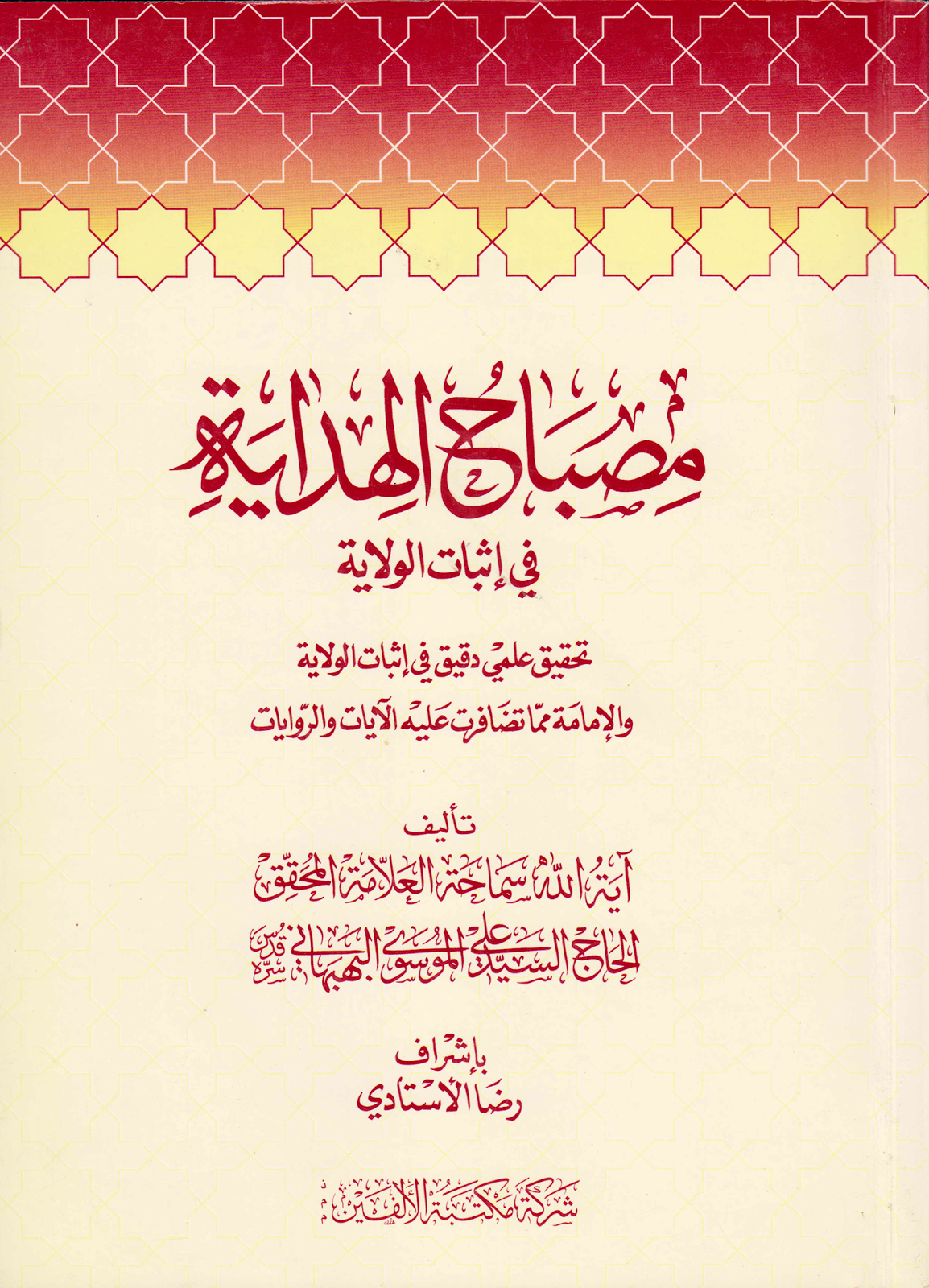al-Sayyid Hashim al-Bahrani († 1696) :
Sayyid Murtadha in 'Uyun al-Mu'jizat said: Narrated Abu AbdAllah Muhammad bin Ahmad who said, my father narrated and said, Ali bin Farukh al-Saman narrated and said, Narrated Yahya bin Zakariya al-Munqari who said, narrated to me Sufyan Ibn 'Ayinah who said, narrated to me Omar bin Abi Sulaym al-'Issah from Ja'far bin Muhammad [al-Sadiq] that he said: On the day of Ghadir, the Messenger of God ordered the construction of a pulpit from camel saddles and then summoned the people toward Ali and said: “One who has me as his master has ‘Alī as his master. O Allāh! Befriend him who befriends him, and be his enemy who is his enemy, help him who helps him and degrade him who degrade him.” The news spread quickly all over urban and rural areas. When Nu’man Ibn al-Harith al-Fehri came to know of it, he rode his camel and came to Medina and went to the Messenger of God and said to him: “You commanded us to testify that there is no deity but God and that you are the Messenger of God. We obeyed you. You ordered us to perform the prayers five times a day and we obeyed. Then you commanded us to offer pilgrimage to Mecca and we obeyed. But you are not satisfied with all this and you raised this child and imposed him upon us by saying Ali is the Master of whom I am Master.’ Is this imposition from God or from you?” The Prophet said: “By God who is the Only Deity! This is from God, the Mighty and the Glorious.” On hearing this Harith turned back and proceeded towards his she-camel saying: “O God! If what Muhammad said is the truth then fling on us a stone from the sky and subject us to severe pain and torture.” He had not reached his she-camel when God flung at him a stone which struck him on his head, penetrated his body and passed out through his lower body and left him dead. It was on this occasion that God caused to descend the following verse: “A supplicant asked for a punishment bound to happen.”{70:1} [Madinat al-Ma'ajiz, Volume 1, Page 407-408]
الثامن والخمسون ومائة الحجر الساقط على رأس النعمان بن الحارث فقتله حين قال ما قال 270 - السيد المرتضى في عيون المعجزات: قال: حدث أبو عبد الله محمد بن أحمد، قال: حدثنا أبي، قال: حدثني علي بن فروخ السمان، قال: حدثني يحيى بن زكرياء المنقري، قال: حدثنا سفيان ابن عيينة، قال: حدثني عمر بن أبي سليم العيسى، عن جعفر بن محمد الصادق، عن أبيه - عليهما السلام - قال: لما نصب رسول الله - صلى الله عليه وآله - عليا - عليه السلام - يوم غدير خم، وقال: من كنت مولاه فعلي مولاه، اللهم وال من والاه وعاد من عاداه، وانصر من نصره، واخذل من خذله، وطار ذلك في البلاد، ثم قام على رسول الله - صلى الله عليه وآله - النعمان ابن الحارث الفهري على قعود له [وقال:] (2) يا محمد أمرتنا عن الله عز وجل أن نشهد أن لا إله إلا الله، وأنك محمد رسول الله، فقبلنا ذلك منك، وأمرتنا بالصلاة الخمس فقبلناها منك، وأمرتنا بالزكاة فقبلناها منك، وأمرتنا بالحج فقبلناه منك، وأمرتنا بالجهاد فقبلناه منك، ثم لم ترض حتى نصبت هذا الغلام وقلت: من كنت مولاه فهذا مولاه، هذا شئ منك أو من الله عز وجل؟ فقال - صلى الله عليه وآله -: من (1) الله تعالى. ثم قال للنعمان: والله الذي لا إله إلا هو إن هذا هو من عند الله جل اسمه. فولى [النعمان بن] (2) الحارث يريد راحلته، وهو يقول: اللهم إن كان هذا هو الحق من عندك فأمطر علينا حجارة من السماء أو ائتنا بعذاب أليم، فما وصل إليها حتى أمطره الله عز وجل بحجر على رأسه فقتله، فأنزل الله تعالى {سأل سائل بعذاب واقع} (3).







































